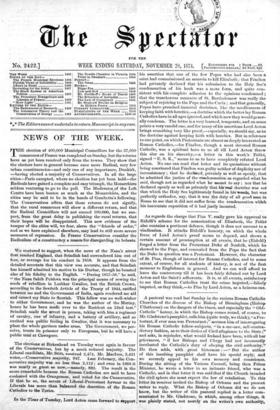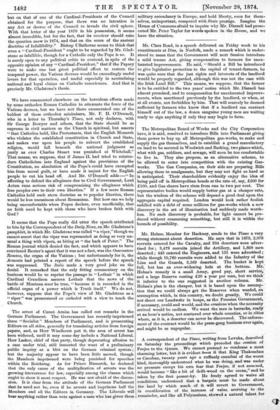A pastoral was read last Sunday in the various Roman
Catholic Churches of the diocese of the Bishop of Birmingham (Bishop Ullathorne) on the dangers of the times, and especially the " Old- Catholic " heresy, in which the Bishop comes round, of course, to Mr. Gladstone's pamphlet, calls him (quite truly, we think)," a Pro- testant, if ever man was Protestant ;" accuses him of interrogating his Roman Catholic fellow-subjecta, " in a see-saw, self-contra- dictory fashion, as to their duties of Civil allegiance to the State ;" and asks, in rejoinder, what would Ireland have been, with all her grievances, "if her Bishops and Clergy had not incessantly inculcated the Catholic's duty of obeying the civil authority." He then adds, with great bitterness : —" But • the author of this insulting pamphlet shall have his special reply, and we securely appeal to his own memory and conscience. During the sitting of the Vatican Council, being then Prime Minister, he wrote a letter to an intimate friend, who was a. Catholic, and in that letter it was said that if the Church invaded the civil sphere she must expect the law of retaliation. To this letter its receiver invited the Bishop of Orleans and the present writer to reply. What the Bishop of Orleans did we do not know, but the writer of this pastoral replied in a letter com- municated to Mr. Gladstone, in which, among other things, it was plainly stated, not merely on the writer's own authority,
but on that of one of the Cardinal-Presidents of the Council obtained for the purpose, that there was no intention in any Act or decree of the Council to invade the civil sphere. With that letter of the year 1870 in his possession, it seems almost incredible, but for the fact, that its receiver should raise the question anew in 1874, and that on the score of the ancient doctrine of Infallibility." Bishop Ullathorne seems to think that even a " Cardinal-President " ought to be regarded by Mr. Glad- stone as infallible, though for a Catholic only the Pope is so. It is surely open to any political critic to contend, in spite of the opposite opinion of any "Cardinal-President," that if the Papacy were to make one last great political effort to restore the temporal power, the Vatican decrees would be exceedingly useful levers for that operation, and useful especially in neutralising national and loyal claims on Catholic consciences. And that is precisely Mr. Gladstone's thesis.







































